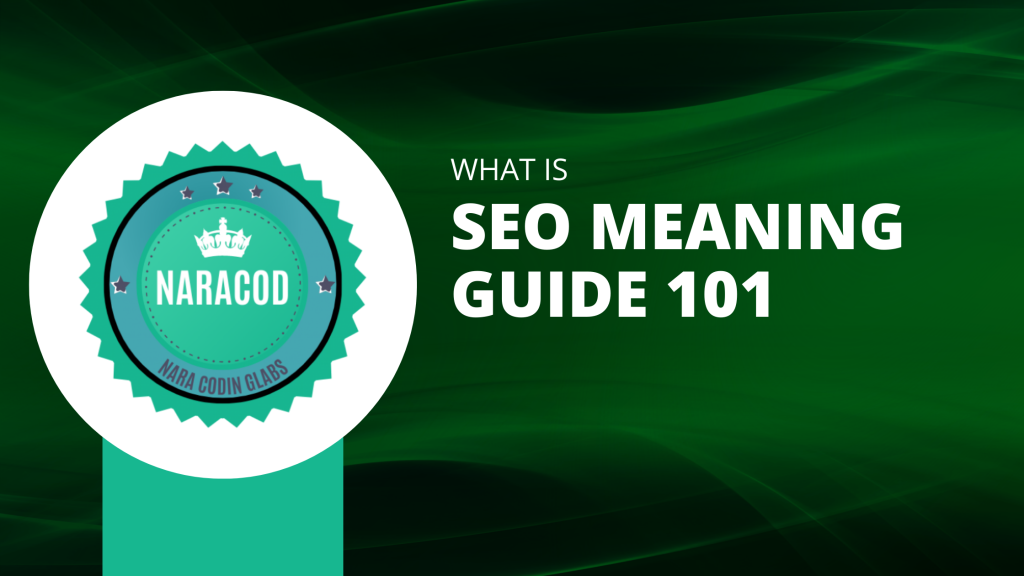During digital landscape, where millions of websites compete for user attention, having a well-optimized online presence is of paramount importance. Search Engine Optimization (SEO) is the practice of optimizing websites to rank higher in search engine results pages (SERPs). It involves various techniques and strategies aimed at improving a website’s visibility, organic traffic, and overall online performance. In this comprehensive guide, we will delve into the intricacies of SEO, exploring its meaning, importance, key components, best practices, and the ever-evolving landscape of search engine algorithms.
What Is SEO And How Does It Works?
Search engine optimization (SEO) is the practice of improving the ranking of a website on search engines. The higher the ranking, the more likely people are to find the website. SEO can be done manually or through the use of software.

SEO is used to improve the visibility of a website. When someone searches for a term that is related to a website, the website is more likely to appear in the search results if it has been optimized.
SEO is a long-term process. It can take several months for a website to see any improvement in its ranking. The best way to achieve a high ranking is to provide valuable content that is relevant to the search terms that people are using.
SEO is a complex process that requires a lot of time and effort. There are many factors that go into improving a website’s ranking. Some of the most important factors include the title of the website, the keywords that are used, the metadata,
How Do I Start SEO For Beginners?
There are a few things you need to do in order to start SEO for beginners. The first is to choose the right keywords. You want to find keywords that have a high search volume but a low competition level. This can be done with a tool like the Google AdWords Keyword Planner.
Once you have your keywords chosen, you need to create content around them. You want to make sure your content is high quality and provides value to your readers. You also want to make sure you include your keywords throughout your content.
The next step is to start building links to your content. You can do this by guest blogging, submitting articles to directories, and participating in social media. If you follow these steps, you will be well on your way to starting SEO for beginners.
What Is SEO In Business?
SEO is the process of optimizing a website or web page for Google search with the goal of earning higher web traffic levels and improving the visibility of the site. The higher the web traffic, the more likely it is that potential customers will visit the site. The higher the website visibility, the more likely it is that the site will be found by customers who are looking for the products or services that the site offers.

There are many techniques that can be used in order to improve a website’s visibility and web traffic. Keyword research is one of the most important techniques, as it involves identifying the keywords that are most relevant to the site and its products or services. Once the keywords have been identified, they can be included in the website’s content, as well as in the titles and descriptions of the site’s pages. Additionally, the website can be promoted through paid advertising and by building links from other websites.
What Is SEO Skill?
SEO skill is the ability to improve a website’s visibility and organic search traffic. It is the process of optimizing a website for the search engines, which can include on-page optimization, link building, and keyword research.

SEO is a critical component of online marketing, and it can be used to improve a website’s visibility, attract more visitors, and increase sales. While it is important to have a good understanding of SEO, it is also important to have the skills to execute the necessary changes.
SEO skills are important for online marketers, webmasters, and business owners. By improving a website’s visibility and organic search traffic, they can attract more visitors, increase sales, and improve their bottom line.
How Much Is SEO Per Month?
The cost of SEO services can vary depending on a number of factors, including the size and complexity of your website, the number of keywords you want to target, and the level of competition for those keywords. That being said, the average cost of SEO services is around $1,000 per month.
There are a number of things you can do to keep your SEO costs down, including targeting a smaller number of keywords, optimizing your website yourself, or working with an SEO consultant on a project-by-project basis. However, if you want to achieve the best possible results, it’s usually best to invest in a full-service SEO campaign.
If you’re looking for a reliable and experienced SEO company, contact us today for a free consultation. We’ll help you determine the best course of action for your business and give you a quote for our services.
Chapter 1: Understanding SEO
Defining SEO
SEO, in its simplest form, is the process of enhancing a website’s visibility on search engines. It involves optimizing both on-page and off-page elements to ensure that search engines can easily crawl, index, and rank a website. The ultimate goal of SEO is to increase organic traffic, which refers to the number of visitors acquired through unpaid search results.
The Importance of SEO
In an era where search engines are the primary source of information for the majority of internet users, SEO has become crucial for businesses and individuals looking to establish an online presence. Ranking higher on SERPs not only drives more organic traffic but also increases brand visibility, credibility, and ultimately leads to higher conversion rates.
Chapter 2: Key Components of SEO
On-Page Optimization
On-page optimization involves optimizing various elements within a website to make it search engine-friendly. This includes optimizing meta tags, headings, URL structure, keyword usage, content quality, internal linking, and user experience. On-page optimization ensures that search engines understand the website’s content and relevance to users’ search queries.
Off-Page Optimization
While on-page optimization focuses on improving elements within the website, off-page optimization involves activities outside the website that impact its search engine rankings. This includes building high-quality backlinks, social media marketing, guest blogging, influencer outreach, and online reputation management. Off-page optimization helps search engines determine the website’s authority, relevance, and popularity.
Technical SEO
Technical SEO refers to optimizing the technical aspects of a website to enhance its crawlability, indexability, and overall performance. This includes optimizing website speed, mobile-friendliness, site architecture, XML sitemaps, robots.txt, canonical tags, structured data, and ensuring proper redirects. Technical SEO ensures that search engines can efficiently crawl and understand the website’s content.
Chapter 3: SEO Best Practices

Keyword Research
Keyword research is the foundation of any successful SEO strategy. It involves identifying relevant keywords and phrases that users search for when looking for products, services, or information related to a website’s niche. Tools like Google Keyword Planner, SEMrush, and Ahrefs can help identify high-volume, low-competition keywords that can be targeted for better visibility.
Content Optimization
Creating high-quality, informative, and engaging content is crucial for SEO success. Optimizing content involves incorporating targeted keywords naturally, writing compelling titles and meta descriptions, using appropriate headings, and structuring the content for easy readability. Additionally, content must be regularly updated to stay relevant and provide value to users.
Link Building
Building high-quality backlinks from reputable websites is a key off-page optimization strategy. Backlinks serve as endorsements and signals of trust to search engines, improving a website’s authority and search engine rankings. Link building can be achieved through guest posting, influencer outreach, content promotion, and participating in relevant online communities.
User Experience Optimization
User experience (UX) plays a crucial role in SEO. Search engines prioritize websites that offer a seamless and satisfying user experience. Factors like website speed, mobile-friendliness, intuitive navigation, clear calls to action, and engaging design contribute to a positive user experience. Optimizing for UX can lead to longer on-site visits, lower bounce rates, and improved search engine rankings.
Chapter 4: Algorithm Updates and Future Trends
Google Algorithm Updates
Google, being the dominant search engine, frequently updates its algorithms to deliver the most relevant and high-quality search results. Understanding major algorithm updates like Panda, Penguin, Hummingbird, RankBrain, and BERT is essential for staying ahead in the SEO game. These updates prioritize user intent, content quality, mobile-friendliness, and E-A-T (expertise, authoritativeness, trustworthiness).
Voice Search and Mobile Optimization
With the rise of voice assistants like Siri, Alexa, and Google Assistant, optimizing for voice search has become crucial. Voice search queries tend to be longer and conversational, requiring a different approach to keyword targeting and content optimization. Additionally, mobile optimization is vital since the majority of searches are now conducted on mobile devices.
Artificial Intelligence (AI) and Machine Learning (ML)
As AI and ML continue to evolve, they have a significant impact on SEO. Search engines are becoming smarter in understanding user intent and delivering personalized search results. AI-powered tools can help automate keyword research, content creation, and link building processes. Staying abreast of AI and ML advancements is essential for staying competitive in the SEO landscape.
Conclusion
SEO is a multifaceted discipline that requires continuous learning, adaptation, and implementation of best practices. By understanding the meaning and importance of SEO, mastering its key components, and staying updated with algorithm updates and future trends, businesses and individuals can improve their online visibility, drive organic traffic, and achieve sustainable success in the digital realm. Remember, SEO is a long-term investment that rewards those who are committed to providing valuable content and exceptional user experiences.






